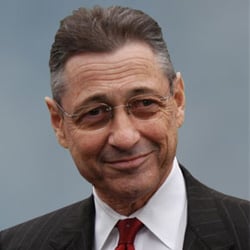Jury instructions critical in trial of former top lawmaker over $4M in legal referral fees

Photo of Sheldon Silver from the New York State Assembly
As closing arguments began Monday in the federal corruption case of a former top New York lawmaker, observers said jury instructions, along with what prosecutors and defense lawyers say, will play a major role in determining whether Sheldon Silver is found guilty.
Still a member of the New York Assembly, the former speaker is accused in the Manhattan case of misusing his state government influence to obtain some $4 million in attorney fees in exchange for generating business for two law firms.
However, that isn’t necessarily illegal, professor Vincent Bonventre of Albany Law School told the Democrat & Chronicle.
“Does it look like there are terrible conflicts of interest? Yes. Does it look like politicians with a lot of power are making lots of money? Yes,” he told the newspaper, as another Democrat & Chronicle article reported last week. “Should that be going on? Almost certainly no. But the question is whether that kind of conduct actually constitutes a federal crime.”
Bonventre called jury instructions “the most critical part of the Shelly Silver case,” the newspaper reported Monday, noting the critical role of defense counsel in advocating with the judge on this front.
“These ethical violations, this sleaziness, this unseemliness, that’s not criminal,” said Bonventre, and the government must prove all elements of the bribery and kickback crimes with which Silver is charged before he can be convicted.
Two low-profile “law guys” have a critical role in jury instructions and were key players on Thursday during a conference outside the jury’s purview, the New York Times (reg. req.) reports.
Although barely visible, if at all, during the trial, prosecutor James McDonald and defense lawyer Robert Kry are the go-to guys when it comes to arguing the language of jury instructions, the newspaper reported, equating them with assistant football coaches who stand on the sidelines and determine when a referee’s call should be challenged.
Both clerked for U.S. Supreme Court justices, and graduated from highly regarded law schools: McDonald, 33, earned his degree from the University of Virginia; Kry, 40, is a graduate of Yale Law School.
At one point during the Thursday conference, the two debated what, exactly, constitutes a quid pro quo, concerning Silver’s conduct and what he got in return, the newspaper recounts.
“We have to show that he intended to have an exchange; that’s what quid pro quo means,” McDonald said. But Kry focused on Silver’s mental state, the Times reports, arguing that the government had to show Silver intended to accept what he understood to be a bribe.
U.S. District Judge Valerie Caproni, who is overseeing the Manhattan case, did not immediately decide the issue.
Related coverage:
ABAJournal.com: “Trial begins for former NY Assembly leader accused of misusing office to earn legal fees”
ABAJournal.com: “Quid pro quo? Doctor testifies about ‘relationship’ with lawmaker who got millions in referral fees”
New York Times (reg. req.): “What to Expect in Week 4 of Sheldon Silver’s Trial”



